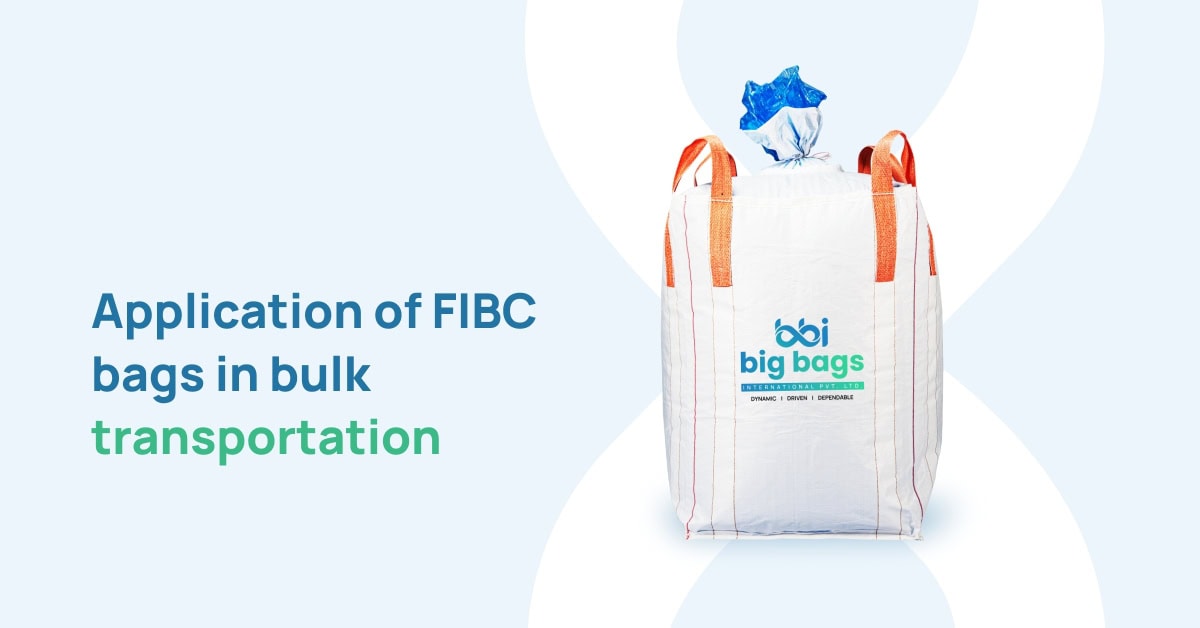Application of FIBC Bags in Bulk Transportation

FIBC bags are so versatile that they suit almost every industry. From agriculture, construction, and chemical manufacturing to the food and beverage industry, FIBC bags work almost everywhere. Where there’s a need for packaging products efficiently, storing them safely, and shipping them without damage and contamination, FIBC bags are the right choice.
Read on to understand why FIBC bags are popular and how their application suits bulk transportation in various industries.
What Makes FIBC Bags Popular?
Packaged products go through multiple stages in a supply chain where normal wear and tear can damage the goods. Using an FIBC bulk bag not only ensures the goods are protected but also facilitates easy handling, stacking, and transportation of the material.
The following distinctive features of FIBC bags make them a popular choice for storing and transporting industrial packaging materials:
- Light Weight: FIBC bags have the lowest package-to-product weight ratio. Each bulk bag’s load capacity ranges between 500–2,000 kg, with the package weight as little as 2–3 kg.
- Flexible packaging: FIBC bags can be made in practically any size that works for your business. Measurements don’t usually exceed 45–48 inches (110 cm) in diameter and 79 inches (200 cm) in height.
- Customization: FIBC bag manufacturers provide various customisation options like lining, top and bottom construction, ventilation, spouts, etc., to make the bag suit your business.
- Sustainable: FIBC bags can be recycled, reconditioned, and reused, making these bags sustainable and environmentally friendly industrial packaging materials.
- Space-saving: FIBC bags can be neatly stacked on top of one another, ensuring a clean and organised facility while saving valuable warehouse space.
- Cost-efficient: Jumbo bags offer great value for money by reducing overhead expenses and overall transportation and labour costs.
Uses of FIBC Bags in Bulk Transportation
FIBC bags serve multiple industries by providing a durable, reliable, sustainable, and flexible packaging solution for bulk goods. Below are some examples of industries that rely on FIBC bags for bulk transportation needs:
1. Agriculture Industry
Agriculture ranks as one of the heaviest users of FIBC bags for storing and transporting various products. FIBC bags are used for packing grains, seeds, seasonal produce, and all different harvests—whether they are wet, dry, granulated, or fine-powdered.
2. Food Processing Industry
Agriculture ranks as one of the heaviest users of FIBC bags for storing and transporting various products. FIBC bags are used for packing grains, seeds, seasonal produce, and all different harvests—whether they are wet, dry, granulated, or fine-powdered.
3. Chemical Industry
The chemical industry deals with hazardous goods that need to be handled with care. Static charges accumulating in containers carrying certain products may pose significant risks to employees and the surrounding environment. As a result, FIBC bags are preferred in the chemical industry, especially Type C and Type D bags, which are designed to have antistatic properties, leakproof seams, and dust-proof linings for complete protection.
4. Construction Industry
The chemical industry deals with hazardous goods that need to be handled with care. Static charges accumulating in containers carrying certain products may pose significant risks to employees and the surrounding environment. As a result, FIBC bags are preferred in the chemical industry, especially Type C and Type D bags, which are designed to have antistatic properties, leakproof seams, and dust-proof linings for complete protection.
5. Pharmaceuticals Industry
From raw materials to finished products, managing impurities and contamination at the microscopic level is crucial when handling pharmaceutical materials. Pharma-grade FIBC bags have anti-static properties and are lined from the inside to prevent contamination. Their sterile manufacturing processes and strict hygiene standards make them suitable for carrying pharmaceutical products.
6. Minerals and Powdered Substances
Mineral and powdered substances are efficiently packed and transported using FIBCs as they are a cost-effective, convenient, and sustainable solution. Ore concentrates, agricultural minerals, and industrial minerals (TiO2, carbon black, etc.) are some of the minerals that can be transported safely using FIBC bags.
Also Read : Guide To Choosing the Right FIBC Bags for Business
How To Choose FIBC Bags for Bulk Transportation?
When choosing the right FIBC bag for bulk transportation, analyse the type of product you’re packaging, its storage, and transport methods. Based on this, you can identify what customisation your bag may require for efficient operations.
There are multiple extra accessories you can include with your bulk bag selections, such as colour-coded lift loops, document pouches, logo printing, locks, etc., to make them unique.
Always be careful while choosing the fabric type, bag size, coating, and filling methods, as these criteria determine the most suitable FIBC design. The FIBC bag manufacturer you choose for your bulk transportation needs should be experienced, certified, and familiar with all the customisation options and raw material prices to provide you with the best quality bag at a competitive price.
Big Bags International is capable of fulfilling all your custom requirements while promising quality and prompt delivery. As a professional FIBC bag manufacturer and supplier of bulk packaging applications, we’ll help you make the best choice for your business. Check out our website and learn more today.
